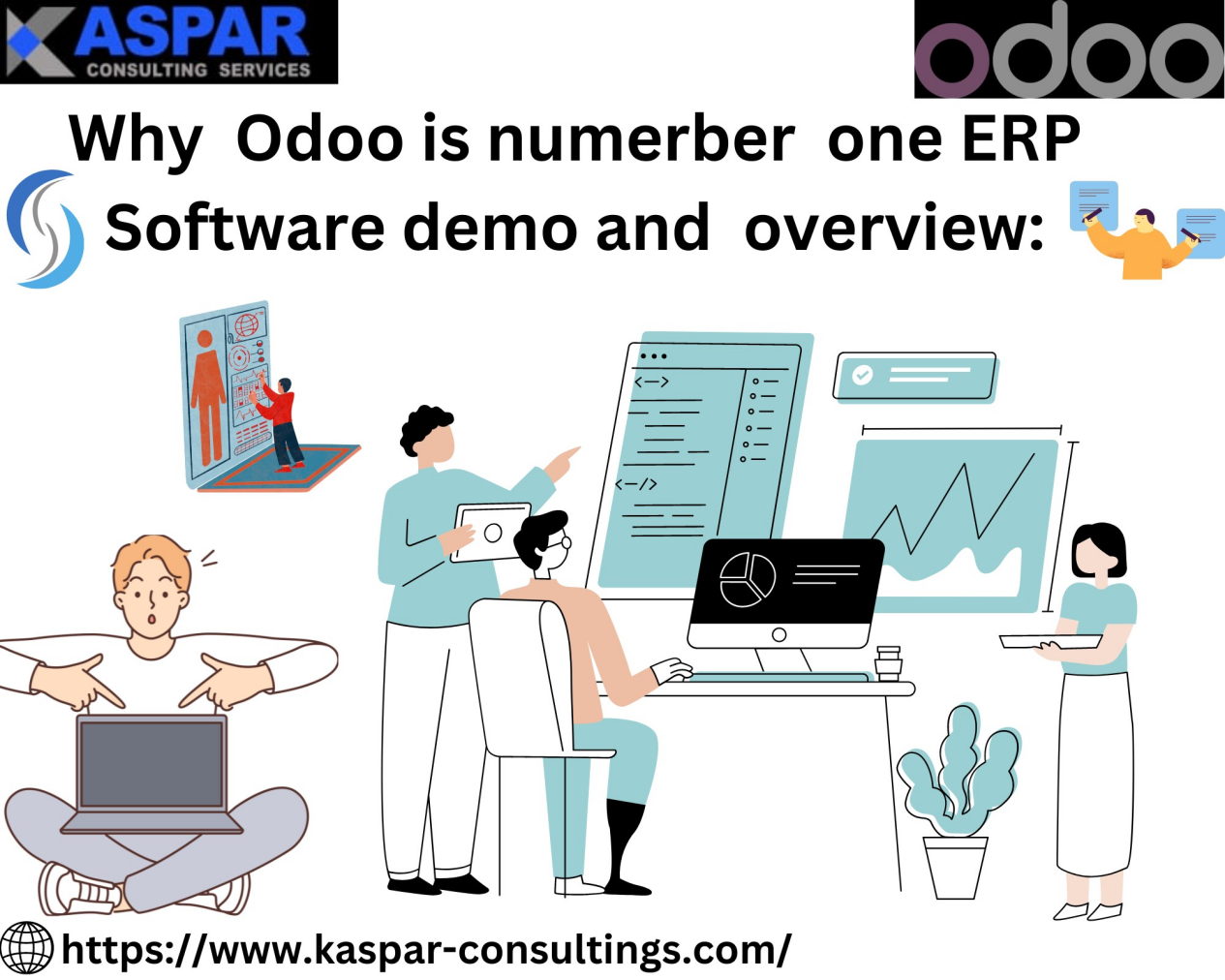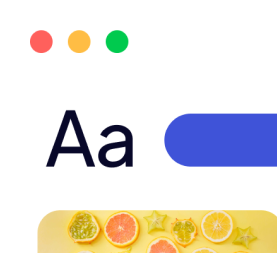- Odoo
- April 23, 2024
- 10 Minutes
Why Odoo is number one ERP Software demo and overview

Author
Asim Jibran
Brief Overview:
Odoo is a Number One ERP Software suite that encompasses a wide range of applications and modules to help companies streamline their operations and enhance productivity. It provides solutions for various business functions, including customer relationship management (CRM), sales, inventory management, accounting, manufacturing, human resources, and more.
Importance of Odoo
Odoo has gained prominence in the business software landscape due to its versatility, scalability, and open-source nature. It empowers organizations to optimize their processes, improve decision-making, and stay competitive in today’s fast-paced business environment. Understanding and harnessing the power of Odoo can be a game-changer for businesses of all sizes and industries.
Stay tuned as we delve into the history of Odoo and its journey to becoming a leading Number One ERP Software and business management solution.
Key Milestones
Version 5.0 (July 2008):
Introduction of a new user interface.
Enhanced reporting and document management.
Improved usability and workflow features.
Version 6.0 (December 2010):
Integration of a customizable website builder.
Enhanced CRM (Customer Relationship Management) features.
Introduction of a social networking module.
Version 7.0 (November 2012):
Major UI overhaul for a more modern and user-friendly interface.
Enhanced e-commerce capabilities.
Improved performance and scalability.
Version 8.0 (September 2014):
Rebranding from OpenERP to Odoo.
Introduction of a new accounting module.
Improved website builder and e-commerce features.
Enhanced reporting and business intelligence tools.
Version 9.0 (October 2015):
Introduction of a new mobile app framework.
Improved Point of Sale (POS) system.
Enhancements to e-commerce and website features.
Version 10.0 (October 2016):
Major UI improvements and usability enhancements.
Introduction of a barcode scanning system.
Integration of IoT (Internet of Things) features.
Version 11.0 (October 2017):
Redesigned Point of Sale (POS) interface.
Enhanced inventory management.
Introduction of a new mobile app.
Version 12.0 (October 2018):
Introduction of a new accounting module.
Improved website builder and e-commerce features.
Enhanced document management and reporting.
Version 13.0 (October 2019):
Revamped Point of Sale (POS) interface.
Improved website builder and eCommerce capabilities.
Enhancements to manufacturing and inventory management.
Version 14.0 (October 2020):
New website builder with improved features.
Enhanced inventory management.
Improved document management and collaboration tools.
Version 15.0 (Expected October 2021):
Odoo 15 was expected to bring further improvements to the platform, including enhancements to its existing modules and potentially new features. However, some of these improvements were made in Odoo 15.0
Version 16.0 (Expected October 2022):
Odoo 16 was expected to continue the tradition of regular updates and enhancements to the Odoo platform. It likely introduced improvements in various areas, such as accounting, e-commerce, and inventory management, although specific details would need to be obtained from Odoo’s official sources.
Version 17.0 (Expected October 2023):
As of the current date, Odoo 17.0 is anticipated to be the next major version release, but details about its features and milestones are not available in my knowledge base. You would need to check Odoo’s official announcements and release notes for the most up-to-date information.
Keep in mind that Odoo has a commitment to regular updates and improvements, driven by user feedback and changing business needs. Each new version typically brings enhancements in usability, performance, and functionality to help businesses better manage their operations and processes.
To stay current with the latest Odoo developments and milestones, I recommend visiting the official Odoo website, subscribing to their newsletters or blogs, and participating in their community forums and events where they often share information about upcoming releases and features.
Free Demo Consulation
Popularity and Adoption
Odoo open-source nature, combined with its extensive functionality, has led to widespread adoption across various industries. Its community edition offers a robust set of features for small to medium-sized businesses, while the enterprise edition caters to larger organizations with more complex needs.
Notable features that have contributed to Odoo popularity include:
Modularity: Odoo’s modular approach allows users to choose and customize only the functionalities they need, making it a cost-effective solution.
User-Friendly Interface: The user interface is intuitive and user-friendly, educing the lear: Odooning curve for new users.
Customization’ flexibility allows for extensive customization to meet specific business requirements without the need for extensive coding.
Community Support: A vibrant community of developers and users actively contributes to the software’s development, ensuring regular updates and improvements.
Third-Party Integrations: Odoo API and integration capabilities enable seamless connections with other software, enhancing its versatility.
Odoo Features
Odoo is renowned for its extensive range of features that cover virtually every aspect of business management. These features are organized into various modules, each addressing specific business functions. Let’s explore some of the key features offered by Odoo:
CRM (Customer Relationship Management)
Odoo CRM module helps businesses manage their customer interactions effectively. It enables you to:
• Keep track of leads, opportunities, and customer communications.
• Schedule activities, such as calls, meetings, and follow-ups.
• Analyze sales pipelines and forecast revenue.
• Automate email marketing campaigns.
Sales Management
The Sales module streamlines the sales process, allowing you to:
• Create and manage quotations, sales orders, and invoices.
• Monitor sales performance and targets.
• Handle customer inquiries and complaints.
• Track product availability in real-time.
Inventory Management
With Odoo’s Inventory module, you can manage your stock efficiently by:
• Setting up multiple warehouses and locations.
• racking product movements through barcode scanning.
• Implementing automated reordering rules.
• Performing real-time inventory valuation.
Accounting and Finance
Odoo offers a robust Accounting module that simplifies financial management tasks like:
• Recording transactions and journal entries.
• Generating financial statements and reports.
• Managing taxes and multi-currency transactions.
• Integrating with banking services for automatic reconciliation.
Manufacturing
The Manufacturing module supports various production methods, allowing you to:
• Create and manage bills of materials (BOMs).
• Schedule production orders.
• Track work center efficiency.
• Manage quality control processes.
Human Resources
Odoo’s HR module assists in managing employees and HR processes by:
• Storing employee records and documents.
• Managing leaves, attendance, and timesheets.
• Automating recruitment and onboarding.
• Analyzing workforce performance.
Website Builder
Odoo’s Website Builder simplifies the creation of professional websites with features like:
• Drag-and-drop page building.
• Customizable templates and themes.
• SEO optimization tools.
• Integration with e-commerce functionality.
E-commerce
The E-commerce module empowers businesses to sell products online with:
• Product catalog management.
• Online payment integration.
• Shopping cart functionality.
• Customer account management.
Point of Sale (POS)
Odoo’s POS system offers a complete solution for retail businesses, including:
• Easy-to-use interface for cashiers.
• Inventory synchronization with online sales.
• Support for various payment methods.
• Integration with hardware like barcode scanners and receipt printers.
And Many Many More
In addition to these core modules, Odoo provides a wide range of additional features, such as project management, document management, marketing automation, and more. The flexibility of Odoo’s modular system allows businesses to choose and customize the features that best suit their needs. As we proceed, we’ll delve into each of these features and modules in greater detail, providing insights into how they can benefit your organization. Additionally, we’ll explore how to customize and integrate Odoo to make it work seamlessly for your specific business requirements. Stay tuned for the next chapters, where we will dive deeper into Odoo’s modules and discuss customization options and integration with third-party applications. If there’s a specific Odoo feature you’re eager to learn more about, please let us know, and we’ll prioritize its coverage
A Glimpse into Real-World Success Stories
To further appreciate the aesthetic brilliance of Odoo, let’s take a look at a few real-world success stories of businesses that have harnessed its power.
Sustainable Fashion Boutique: In the realm of sustainable fashion, aesthetics are not just a choice but a brand identity. A boutique that specializes in eco-friendly and ethical fashion integrated Odoo into its operations. With Odoo, they managed their supply chain beautifully, ensuring that every product met their stringent sustainability criteria. The result? An aesthetically pleasing and ethical brand that resonated with environmentally conscious consumers.
Artisanal Chocolate Manufacturer: Crafting artisanal chocolates is an art form in itself. A chocolatier utilized Odoo to manage production processes, inventory, and sales seamlessly. The software allowed them to maintain the artistic quality of their chocolates while efficiently scaling their operations. Their chocolates not only tasted exquisite but also looked like miniature works of art, thanks to Odoo’s precision.
Interior Design Studio: An interior design studio relied on Odoo to manage client projects with an aesthetic eye. With Odoo’s project management and CRM modules, they coordinated their design concepts with client preferences flawlessly. Each project became a visual masterpiece, aligning perfectly with the studio’s creative vision.
The Future of Aesthetic Excellence
As technology advances and businesses continue to evolve, the pursuit of aesthetic excellence in ERP software remains a priority. Odoo, as the number one ERP software, is poised to lead this journey. With an unwavering commitment to aesthetics, efficiency, and innovation, Odoo is not merely a tool; it’s a partner in creating business masterpieces.
In the grand gallery of ERP solutions, Odoo stands as the masterpiece that combines the artistry of aesthetics with the precision of functionality. It empowers businesses to craft their own unique masterpieces, ensuring that every operation aligns with their vision of beauty and efficiency.
Aesthetic Excellence Meets Return on Investment
One of the most remarkable aspects of Odoo is how its aesthetic appeal translates into tangible returns on investment (ROI). Businesses that invest in Odoo not only benefit from its visual allure but also enjoy the financial advantages it offers. Let’s explore how Odoo’s aesthetics contribute to a healthy ROI:
Reduced Training Costs: The intuitive design and user-friendly interface of Odoo minimize the time and resources required for employee training. Just as a well-crafted painting communicates its message effortlessly, Odoo ensures that your team can quickly grasp its functionalities, resulting in cost savings and increased productivity.
Enhanced Customer Engagement: In today’s competitive market, the aesthetic appeal of your operations can significantly impact customer engagement and loyalty. Odoo’s ability to provide a seamless and visually pleasing customer experience fosters brand loyalty, repeat business, and positive word-of-mouth marketing.
Streamlined Operations: Like an artist who meticulously plans each stroke, Odoo streamlines business operations with precision. This optimization reduces operational costs, minimizes errors, and enhances overall efficiency. By automating routine tasks and providing real-time insights, Odoo allows your team to focus on creative and strategic aspects of your business.
Scalability Without Compromise: Just as a masterpiece retains its beauty whether it’s displayed in a small gallery or a grand museum, Odoo scales effortlessly with your business. Its modular approach ensures that you can add or remove features as needed without disrupting your existing aesthetic. This scalability supports your growth objectives while minimizing additional investment costs.
Embracing the Future of Aesthetics in Business
As we step into the future, the fusion of aesthetics and efficiency in Number One ERP Software erpbecomes even more critical. Odoo, as the trailblazer in this realm, will continue to push the boundaries of what is possible. Its commitment to staying at the forefront of technological advancements ensures that your business can consistently leverage the latest innovations to enhance both its aesthetics and efficiency.
Continuous Innovation
A true work of art is never stagnant, and neither is Odoo. The company is committed to continuous innovation, regularly releasing updates and enhancements to improve the user experience and functionality. This dedication to improvement ensures that Odoo remains at the forefront of ERP technology, setting the standard for the industry.
Point of Sale (POS)
Key Features:
Intuitive Interface: Cashiers can efficiently process transactions.
Inventory Synchronization: POS system syncs with online sales and inventory.
Payment Method Support: Accept various payment methods, including credit cards and cash.
Hardware Integration: Easily integrate with hardware like barcode scanners and receipt printers.
Benefits:
Efficient In-Store Sales: Simplify in-store sales processes with an intuitive POS interface.
Real-time Inventory Updates: Inventory synchronization ensures accurate stock levels.
Versatile Payment Options: Accept payments through multiple methods for customer convenience.
These core modules cover a wide range of business functions and are the foundation of Odoo’s capabilities. Businesses can customize and expand their Odoo systems by adding additional modules as needed.
In the following chapters, we will explore how to set up and work with these modules, providing practical guidance for utilizing Odoo effectively in various business scenarios.
Stay tuned for the next chapters, where we will dive deeper into Odoo’s core modules, offering step-by-step guidance and tips for their effective use. If you have any specific questions about any module or would like to learn more about a particular aspect of Odoo, please let us know, and we’ll tailor our coverage accordingly.
Odoo is an open-source business management software suite that offers a wide range of applications for various business functions, including CRM, accounting, inventory management, human resources, e-commerce, and more. Here are some final thoughts and considerations on Odoo
Versatility: One of Odoo’s key strengths is its versatility. It provides a modular approach, allowing businesses to select and integrate the specific modules they need, making it suitable for a variety of industries and company sizes.
Open Source: Odoo is open-source software, which means it is highly customizable and has a strong community of developers and users. This can be advantageous for businesses that require tailored solutions.
Integration: Odoo offers integration between different modules, creating a seamless flow of data across your organization. This can improve efficiency and reduce data entry errors.
User-Friendly Interface: The user interface of Odoo has improved over the years to become more user-friendly and intuitive. However, the ease of use can still vary depending on the specific modules and customization.
Community and Support: Odoo has an active community of users, developers, and partners. You can find a wealth of resources, forums, and community-contributed modules. Additionally, Odoo offers both community and enterprise editions, with the latter providing more robust support options.
Cost Considerations: While Odoo offers an open-source community edition, businesses should be aware that customization, support, and additional modules can incur costs. The enterprise edition, which comes with official support and more features, also has associated licensing fees.
Scalability: Odoo is generally scalable and can grow with your business. However, as your organization expands, you may need to invest more in customization, hardware, and support.
Third-Party Integrations: While Odoo has a wide range of modules, there may be specific functionalities that require third-party integrations. Check if these integrations are available and well-supported.
Data Security and Privacy: As with any business software, ensure that Odoo meets your data security and privacy requirements, especially if you are handling sensitive customer or financial data.
Regular Updates: Odoo typically releases regular updates and new features. Staying up-to-date with these updates is important to access improvements, security patches, and bug fixes.
Free Demo Consulation
Conclusion:
Odoo can be a powerful Number One ERP software solution for many companies due to its flexibility, integration capabilities, and active community. However, before implementing Odoo, carefully assess your specific business needs, budget constraints, and long-term scalability requirements. Additionally, always consider the most recent information and user feedback to make an informed decision about whether Odoo is the right choice for your organization.





